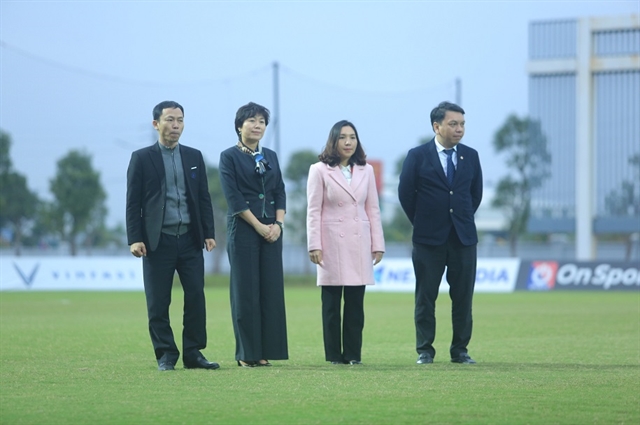
Nguyễn Thị Mỹ Dung (second right) is hoping to end match-fixing. Photo VFF
Peter Cowan
Integrity in professional sport is everything, perhaps more so than any other type of entertainment, as without a level playing field, why would punters pay to watch and why would companies pay to advertise?
It’s no secret that Vietnamese football has long been plagued by corruption at every level of the game, with scandals roiling the lower leagues right up to the V.League 1 and even at the national team level.
However, as with all things Vietnamese football in recent years, there’s cause for hope.
Last week, lawyer and member of the Việt Nam Football Federation’s legal and player qualification department Nguyễn Thị Mỹ Dung was appointed to FIFA’s Disciplinary Committee.
Dung, who is also deputy general director of the PVF academy, and the other members of the committee are in charge of sanctioning associations, clubs, officials, players and plenty of others who break FIFA rules.
I think her appointment could be huge for Vietnamese football, and not just because of the good PR Dung working at FIFA will bring.
Dung recently co-authored an academic paper on corruption in Vietnamese football and if she’s able to put her money where her mouth is, the local game will reap the rewards.
Writing alongside Simon Gardiner in Restoring Trust in Sport, Dung’s article ‘The fight against corruption in Vietnamese football’ provides an insight into how one aspect of corruption takes root in local football and how it can be rooted out.
While the paper only deals with corruption from players rather than institutions, which is likely the bigger issue, it does get to the heart of perhaps the most hated form of corruption in sport: match-fixing.
Dung looks at the 2005 SEA Games and the 2014 Vissai Ninh Bình FC scandals to illustrate what leads players to get involved with betting syndicates.
Both scandals resulted in jail terms for some of those involved, including the national U23 team’s star player Phạm Văn Quyến in the 2005 example, and in the case of Ninh Bình, the eventual dissolution of the club.
Dung identifies inadequate education for players, Việt Nam’s betting culture, a lack of alternate leisure activities and a temptation to spend more than they earn as at the heart of why the players fixed matches.
The education angle is perhaps most interesting as Dung cites that in the SEA Games scandal, police interviews revealed just how naïve some of the country’s most promising talents were about match-fixing.
The seven players involved agreed with a gambler to ensure they beat heavy underdogs Myanmar by just one goal for about US$1,000 each, which would have been a substantial sum for a young footballer at the time.
When interviewed by the police though, the players said they thought there was no harm in fixing the result where they would also win the match and perhaps even worse, they hadn’t considered the possibility that the gambling broker they conspired with could blackmail them to fix more matches.
Dung, correctly in my eyes, points out that key to stopping such incidents is education and support for players, with finding and punishing wrongdoing the last resort.
However for education to work it can’t just be at some of the country’s most glamorous academies which Dung mentions as already leading lights in the work like Hà Nội FC and Hoàng Anh Gia Lai.
While the young players at Hà Nội have plenty of resources at their disposal and the lucrative promise of commercial opportunities off the pitch to keep them on the straight and narrow, it’s the likes of the 11 Đồng Tháp U21 players who were banned for match-fixing a year ago that are being left behind.
So perhaps as well as educating players, coaches and administrators across the country need to be given the skills and resources to steer their young charges in the right direction.
What does seem to be headed in the right direction is the fight to eradicate match-fixing headed by Dung, and you wouldn’t bet against her. VNS
OVietnam